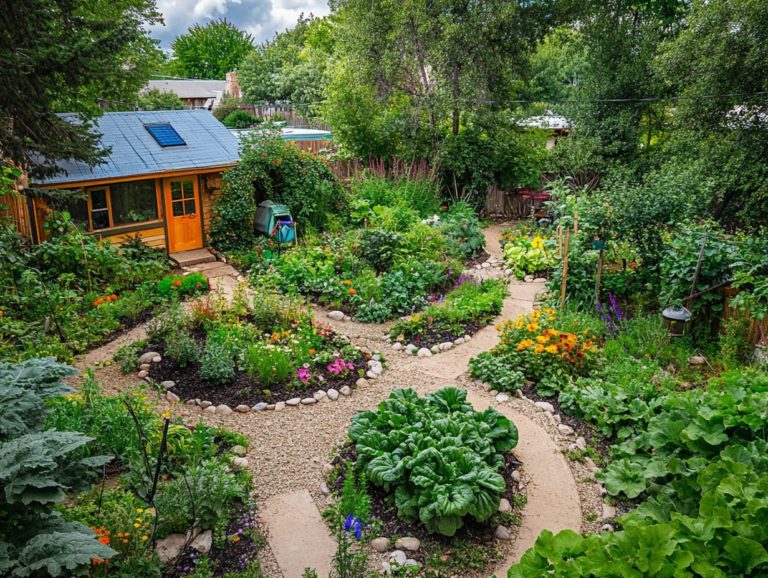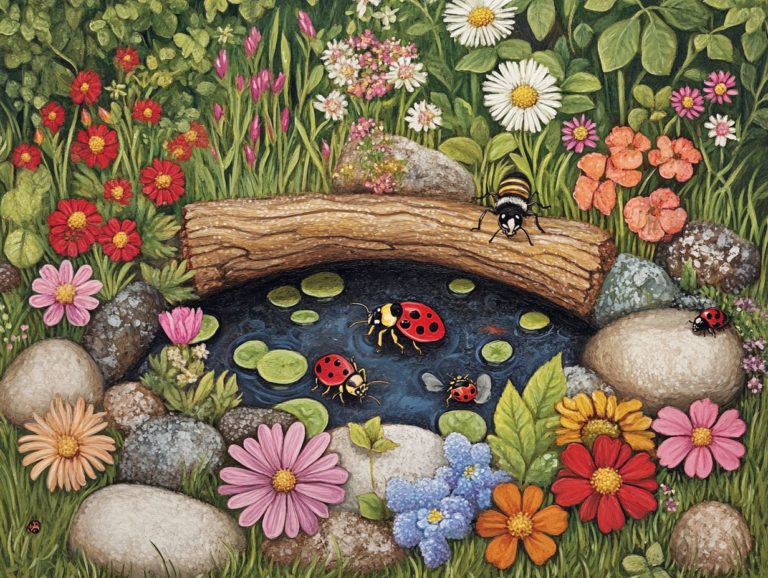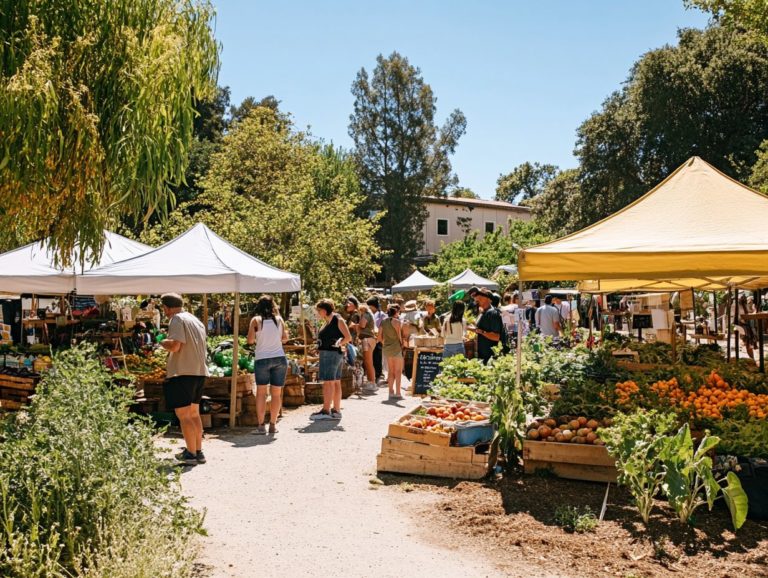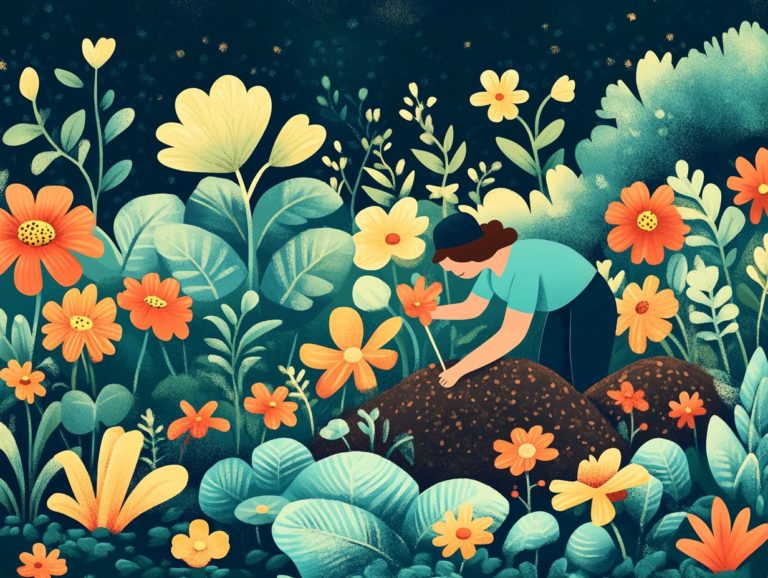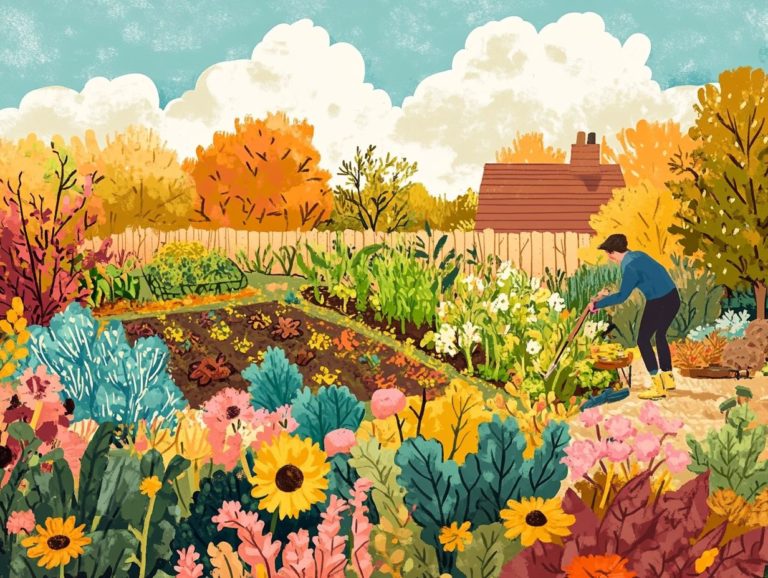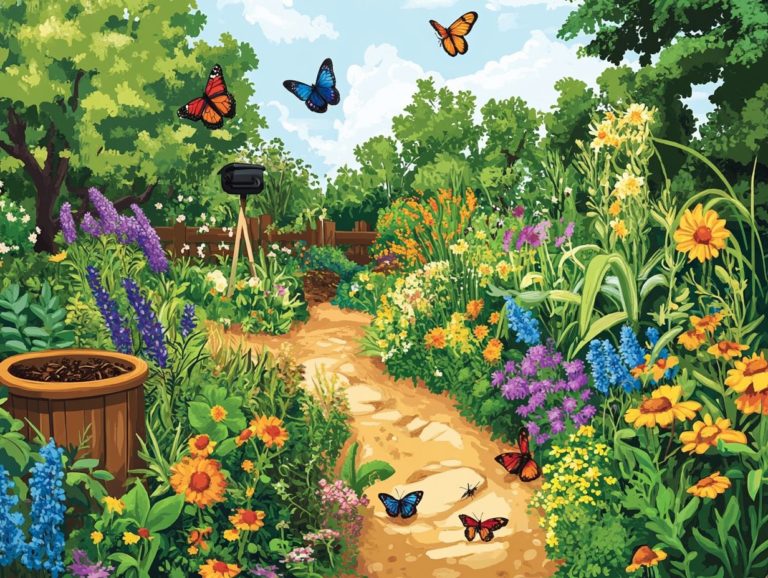What is the Importance of Pollinators in Gardening?
Pollinators play an indispensable role in your gardening endeavors. They influence not only the aesthetic allure of your landscapes but also the vitality of the ecosystems around you.
From buzzing bees and graceful butterflies to a myriad of insects, these vital creatures help plants reproduce. They ensure your blooms are vibrant and your harvests plentiful. Yet, they face a host of threats from environmental factors and human activities.
This article delves into the various types of pollinators and highlights their significance in gardening. It outlines the challenges they face and offers practical tips for cultivating a pollinator-friendly environment.
Immerse yourself in this exploration and discover how you can contribute to this essential cause!
Contents
- Key Takeaways:
- Types of Pollinators
- Importance of Pollinators in Gardening
- Threats to Pollinators
- How to Attract Pollinators to Your Garden
- Frequently Asked Questions
- What is the Importance of Pollinators in Gardening?
- Why are Pollinators Important for Gardening?
- Which Pollinators are Most Important for Gardening?
- How Do Pollinators Benefit the Environment in Gardening?
- What are Some Ways to Attract Pollinators to Your Garden?
- How Can I Support Pollinators in My Gardening Practices?
Key Takeaways:
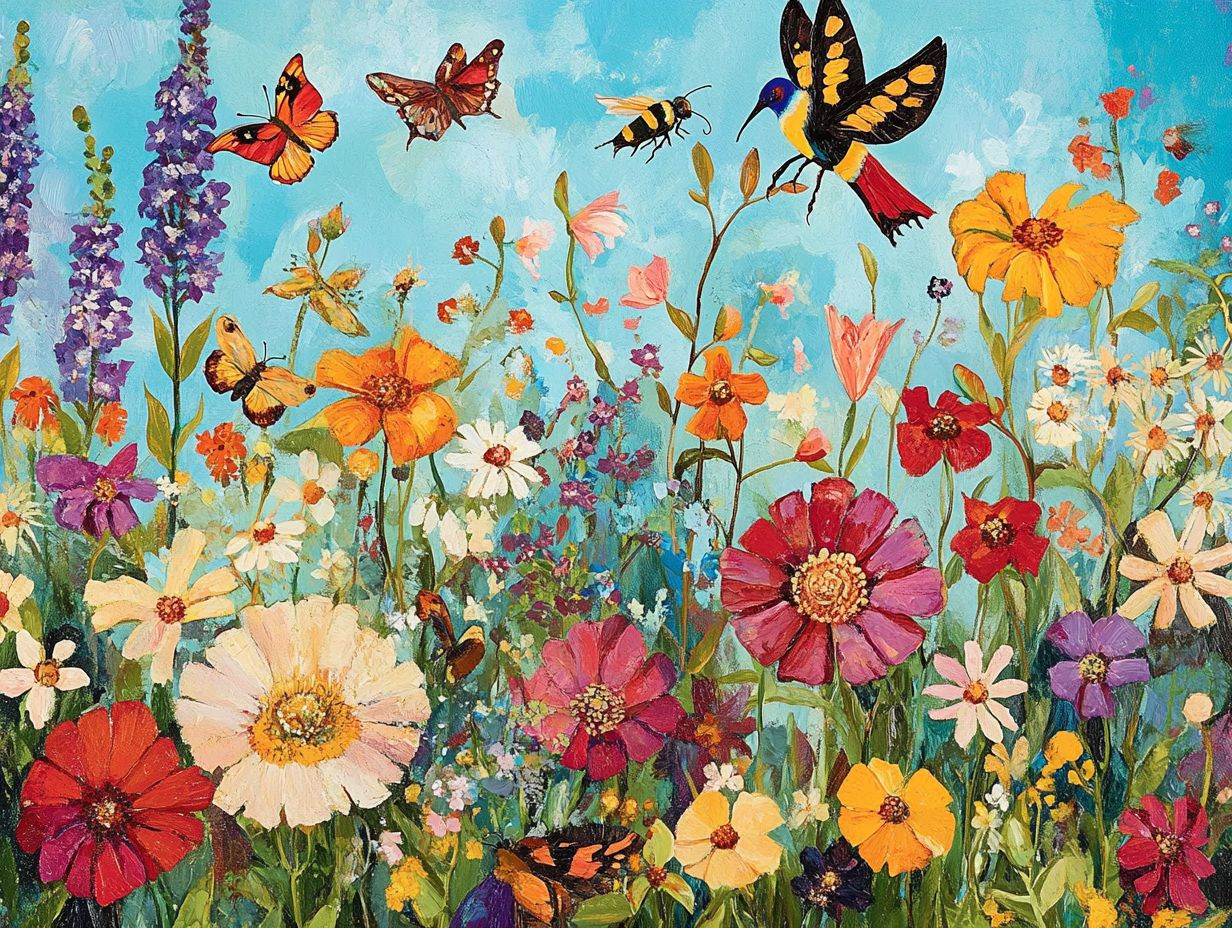
- Pollinators, such as bees and butterflies, are vital in gardening. They help plants reproduce and promote biodiversity.
- Imagine a world without pollinators! Many plants couldn t reproduce, affecting our food supply.
- Creating a pollinator-friendly environment in your garden like planting native flowers can support their important work and enhance local wildlife.
Definition and Role in Gardening
Pollinators, like bees and butterflies, help plants reproduce. This process is vital for many plants. These remarkable beings not only contribute to the health of ecosystems but also support plant diversity.
They offer food sources for wildlife and help cultivate various crops that you rely on for sustenance. By understanding their role in gardening, you enhance your own garden while promoting sustainable practices that protect these essential creatures and their habitats.
Pollination is when pollen from one flower reaches another, helping it to grow seeds. This process is fundamental for the growth of various flowering plants, including fruit-bearing trees and vegetables, which thrive thanks to pollinators.
For example, plants like tomatoes, apples, and melons depend heavily on these industrious creatures for successful reproduction. In turn, native species such as local wildflowers thrive in environments where pollinators are present, fostering a balanced ecosystem.
Engaging in conservation efforts to protect pollinator habitats includes adopting pesticide-free gardening practices. Creating pollinator gardens filled with native flora and raising awareness about the importance of maintaining healthy pollinator populations can make a difference.
By doing so, you contribute to the sustainability of both agriculture and natural ecosystems. This ensures a harmonious environment for all.
Types of Pollinators
Pollinators like bees, butterflies, bats, and birds are crucial in transferring pollen between flowers. This transfer is essential for seed production and plant health.
Each pollinator species has unique behaviors and preferences, influencing the diversity of plants that flourish in different habitats. Understanding these dynamics enhances your appreciation for the delicate balance of nature.
Bees, Butterflies, and Other Insects
Bees and butterflies are vital pollinators. They play an essential role in pollinating many flowering plants.
These remarkable insects are irresistibly drawn to nectar-rich flowers. They possess unique adaptations that enhance their foraging and pollination activities.
Honeybees have a finely tuned sense of smell. This helps them locate flowers from impressive distances. Monarch butterflies have long, tube-like mouthparts to reach deep into tubular flowers.
Both species significantly contribute to plant reproduction, ensuring that the rich diversity of flora continues to flourish.
Their foraging habits boost biodiversity and promote the overall health of ecosystems. They foster genetic diversity among plant populations and support the cultivation of various crops.
Conserving the habitats of these pollinators is crucial. Urban development and farming practices are encroaching on their natural environments. This jeopardizes the delicate balance of ecosystems that these remarkable creatures help sustain.
Importance of Pollinators in Gardening
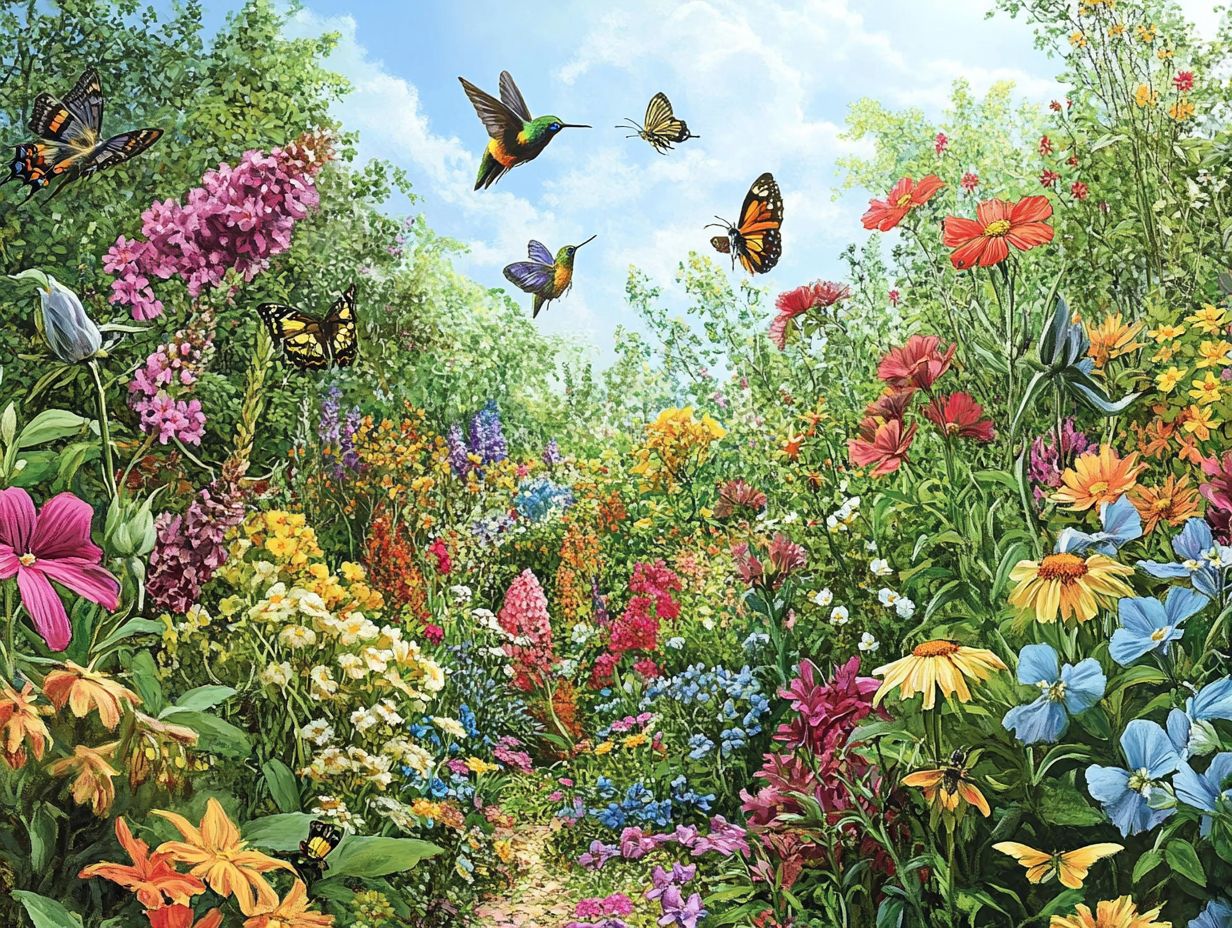
The significance of pollinators in gardening cannot be overstated. They are vital for the successful growth of many food crops and flowering plants, making it essential to understand the importance of sustainability in gardening.
These remarkable creatures maintain the health of garden ecosystems, facilitating plant reproduction.
As a result, they help ensure a plentiful harvest of fruits, vegetables, and seeds that nourish both humans and wildlife alike.
How Pollinators Help Plants Thrive
Pollinators play a vital role in helping plants thrive. They enable the fertilization process essential for seed and fruit development.
Through their diligent efforts, these creatures transfer pollen from one flower to another. This ultimately facilitates the fertilization of ovules.
Certain plants, like orchids, have adapted to attract specific pollinators, such as bees or butterflies. They offer enticing nectar or distinctive scents.
This symbiotic relationship benefits pollinators by providing food sources while plants reap the rewards of genetic diversity and enhanced reproductive success.
A fascinating example of this partnership is the relationship between the yucca plant and the yucca moth. The moth not only pollinates the flowers but also lays its eggs within them, creating a secure environment for its offspring while promoting the plant’s lifecycle.
Threats to Pollinators
Pollinators face serious threats that we must address. Environmental factors like climate change and human activities pose significant risks to their populations and the ecosystems that rely on them.
Habitat loss, the use of pesticides, and the impacts of climate change represent significant challenges for these essential creatures.
Environmental Factors and Human Impact
Environmental factors like habitat degradation, climate change, and pesticide exposure significantly affect pollinators survival and health. These elements disrupt ecosystems, threatening the delicate balance needed for diverse plant and animal species to thrive.
Take habitat degradation, for example. It often stems from urban development and agricultural expansion, leading to the loss of native flowering plants that are critical food sources for these essential creatures.
Then there s climate change, which shifts blooming periods and migratory patterns. This creates mismatches between when pollinators are around and when flowers are in bloom. The widespread use of pesticides directly threatens their health and reproductive capabilities.
To tackle these pressing challenges, we must prioritize conservation strategies that protect and restore habitats while promoting sustainable agricultural practices. By doing so, we can help ensure that pollinators vital for ecosystem health and food production continue to fulfill their crucial roles.
How to Attract Pollinators to Your Garden
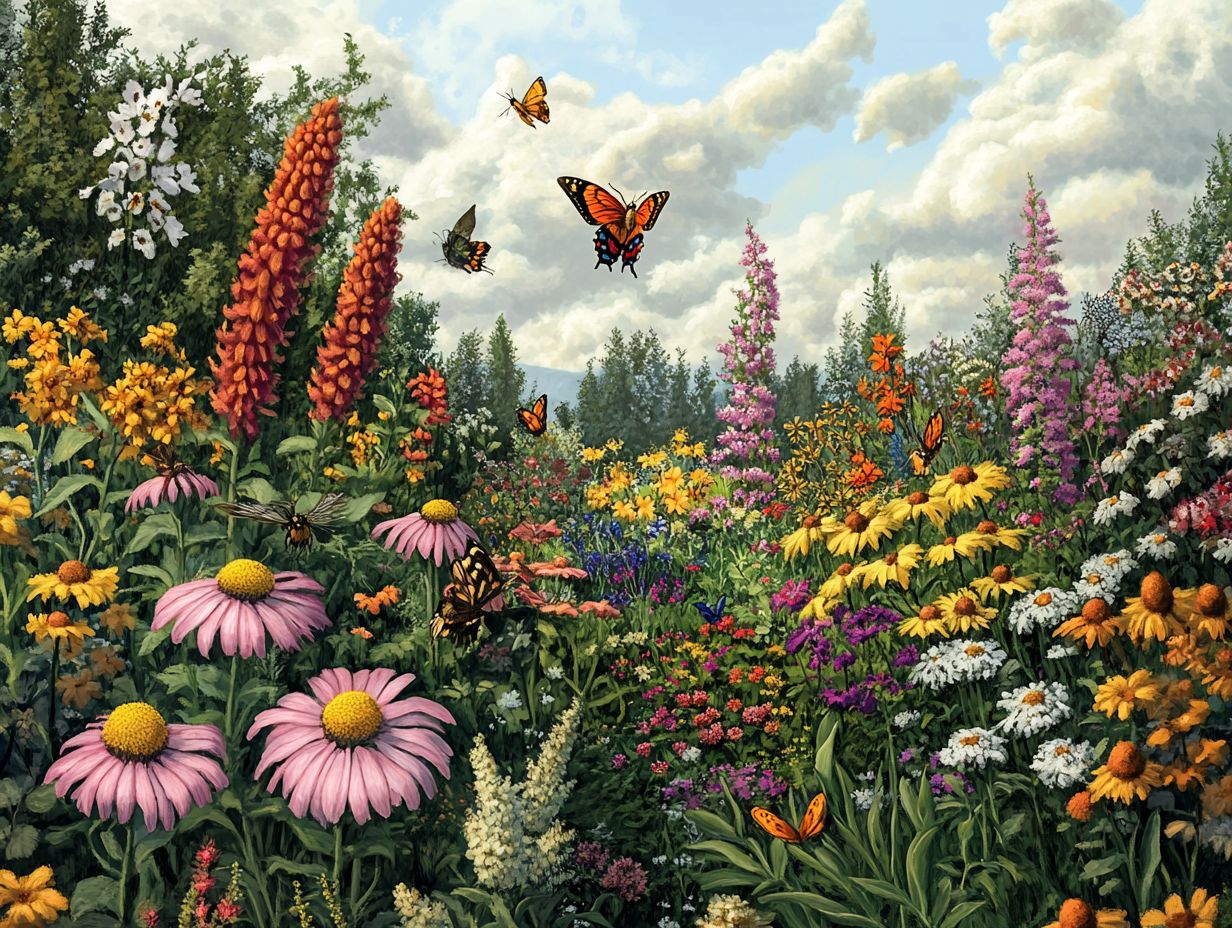
Creating a pollinator-friendly garden is crucial for attracting and nurturing a diverse array of pollinators, including bees, butterflies, and birds. By integrating native plants and offering suitable habitats, you can cultivate a vibrant ecosystem that promotes a variety of plants and animals while encouraging these essential species to thrive.
Your efforts can significantly impact their survival and the health of the environment, benefiting both wildlife and human well-being.
Creating a Pollinator-Friendly Environment
Start incorporating a variety of native plants today for a thriving garden. Focus on incorporating diverse plants that provide essential nectar and pollen sources throughout the growing season. By ensuring that habitats are maintained and protected, you can support the well-being of local pollinator populations.
Select plants that bloom at different times to guarantee a continuous food supply. Safeguarding existing habitats is crucial; minimize pesticide use and create safe spaces where pollinators can thrive. Emphasizing organic gardening practices not only protects these vital creatures but also nurtures the entire ecosystem.
Fostering community awareness and education around the importance of pollinator conservation can inspire collective action. This leads to more vibrant and biodiverse landscapes. Engage in workshops and local events to motivate community members to adopt similar strategies in their gardens, creating a ripple effect that enhances the ecosystems for everyone.
Frequently Asked Questions
What is the Importance of Pollinators in Gardening?
Pollinators play a crucial role in gardening. They are responsible for fertilizing flowers, which leads to the production of fruits and seeds.
Why are Pollinators Important for Gardening?
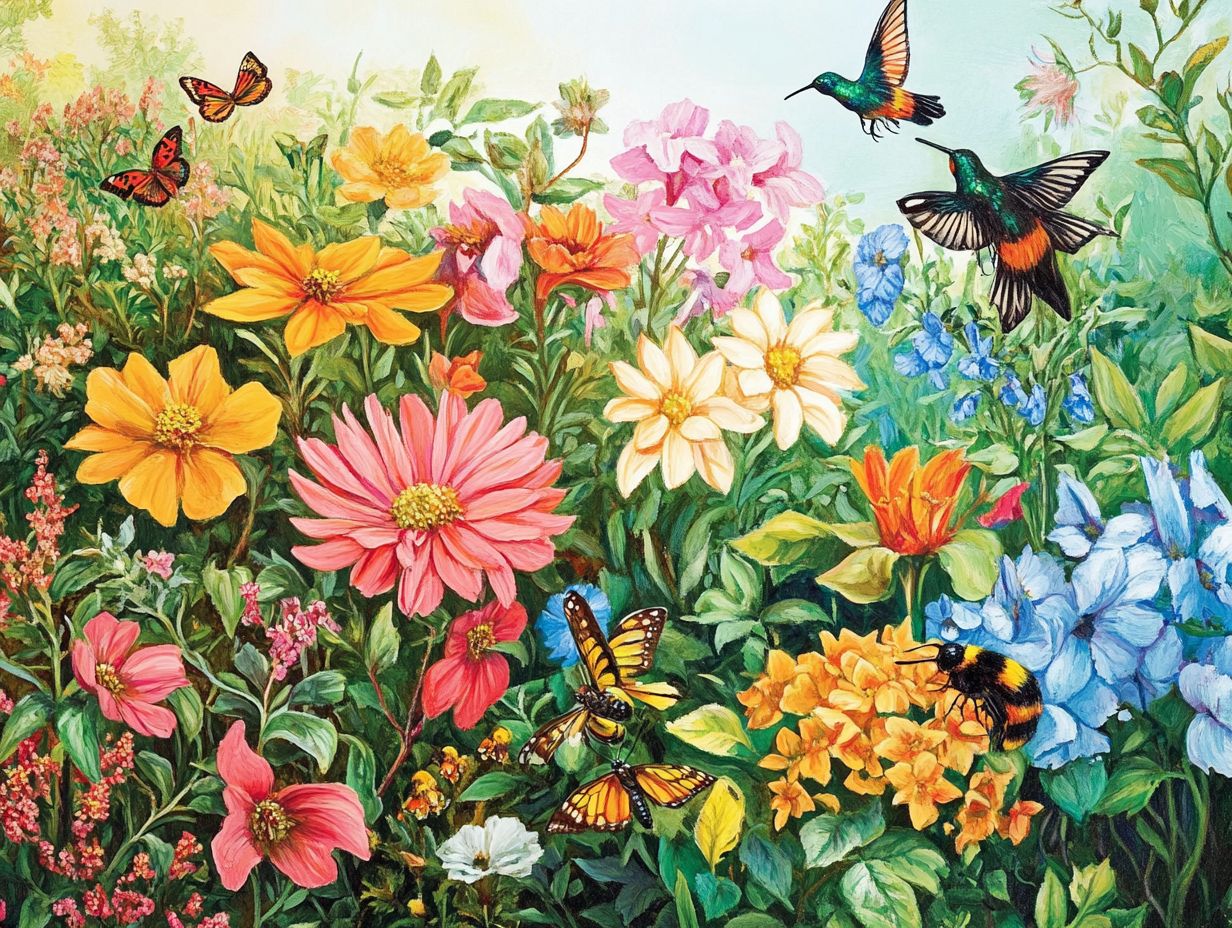
Pollinators are essential for gardening because, without them, many plants would not be able to reproduce and produce fruits or seeds, affecting our food systems.
Which Pollinators are Most Important for Gardening?
Bees, butterflies, birds, and bats are among the most important pollinators for gardening. They visit a wide variety of flowers and are efficient at transferring nectar.
How Do Pollinators Benefit the Environment in Gardening?
Pollinators help grow fruits and vegetables in gardening. They support the growth of wildflowers and other native plants in the surrounding environment, providing food and habitat for other wildlife.
What are Some Ways to Attract Pollinators to Your Garden?
Planting a variety of flowers that bloom at different times, providing a water source, avoiding the use of pesticides, and creating a diverse and sustainable environment are effective ways to attract pollinators to your garden.
How Can I Support Pollinators in My Gardening Practices?
Besides providing a pesticide-free environment and planting pollinator-friendly flowers, create a nesting area for bees and other pollinators. Avoid tilling your garden too often, as it destroys their nests and habitats.
Take action today! Implement these tips in your garden to create a welcoming environment for pollinators.

